Publications [810]

Updated: May 3, 2019 (Initial publication: Aug. 24, 2018)
Publications

Référence générale : Frison-Roche, M.-A., Game of Thrones: a so classical Law. For the moment. Working paper, 2018, http://mafr.fr/en/article/game-of-thrones-un-droit-si-classique/
This working paper has been written to be the base for an article published in French, "Game of Thrones : un Droit si classique. Pour le moment", for a collective book Game of Thrones et le Droit.
Summary. In this series filled with grandiose surprises, epic characters, reversals, and all the more so as it began to run faster than the book it was born, we would find only what we know already of Law: it would be enough to raise the disguises, as one does in a fable. We then find the classic legal rules (I), the reproduction in decal of the feudal legal organization (II), sometimes contested in the name of exogenous principles (III). But it is remarkable that the series is not over yet. But what will happen does not refer to legal issues that we do not control ourselves? Unknown season in the full sense of the term, frozen legal terrain and uncertain soil of a Law that would take the form of "faceless" and "walking dead"? (IV).

Feb. 19, 2019
Publications
Feb. 13, 2019
Publications
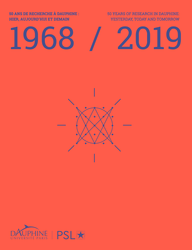
Full reference: Frison-Roche, M.-A., Creating "Regulation Law" at Dauphine, in Huault, I. and Bouchard, B. (ed.), 50 years of Research in Dauphine. 1968-2019, 2019, pp. 110-114
Read Marie-Anne Frison-Roche's article (in French)
Read also:
The foreword of the book written by Bruno Bouchard (in French)

Feb. 9, 2019
Publications

► Référence complète : Frison-Roche, M.-A., Pour une conception humaniste du Droit des affaires et de son enseignement, document de travail, février 2019
____
📝ce document de travail a été élaboré pour servir de base à un article publié un an et demie après sa remise, en novembre 2020 dans les 📘
____
Alain Couret est un grand professeur de Droit et un très bon technicien de celui-ci. On se surprend soi-même non seulement à devoir souligner cette maîtrise technique insérée dans l'activité d'enseignement mais à prévenir qu'il s'agit d'une grande qualité. Cette maîtrise technique et l'aptitude à transmettre le savoir juridique par la compréhension de ses principes de base, n'est-ce pas le métier même de professeur ? Si chacun l'admet, alors désigner ainsi Alain relèverait du pléonasme...
Mais l'on entend souvent aujourd'hui que l'art juridique ne serait plus qu'un art de tordre les textes et les mots dans tous les sens, que ceux-ci s'y prêteraient, voire qu'ils seraient faits pour cela, qu'il faudrait apprendre avant tout à argumenter et à contredire si habilement que le tiers spectateur, qu'il soit juge, auditoire ou opinion publique, sera persuadé à la fin que, dans le cas particulier auquel la discussion est cantonné, l'intérêt défendu est bien le meilleur, que c'est bien celui-ci qu'il faut protéger et non pas celui de l'adversaire, qu'il faut rendre effectif cet intérêt singulier-là. Quitte à penser différemment dans le cas suivant. D'ailleurs, il sera possible par la suite de soutenir une autre cause, puisque les situations ne sont jamais semblables. Dans cette façon de faire, connaître techniquement le Droit et ses principes de base apparaît secondaire. La technique ? Cela serait les machines qui s'en chargeront. Les principes ? Ils seraient à éviter, parce que cela ne servira à rien : à chaque cas sa solution.
Par ses enseignements et ses écrits, Alain Couret exprime le contraire : le Droit des affaires n'est pas réductible à un amas réglementaire, repose sur des principes qui reflètent la conception que l'on se fait de la place des êtres humains dans les échanges, dans l'entreprise, dans l'organisation marchande. Enseigner le Droit des affaires, c'est transmettre ces principes. C'est aussi les discuter. Ecrire, dans une continuité avec l'enseignement, c'est au besoin inventer d'autres principes, tandis que les machines continuent de stocker par milliers les dispositions techniques posées là, chacune équivalente à une autre. Enseigner des principes, seuls les êtres humains sont aptes et soucieux de le faire, à l'exemple d'Alain Couret. Si on l'oublie, alors les professeurs étant devenus des répétiteurs, les machines répéteront bien mieux qu'eux par un débit infatigable les "paquets réglementaires". Mais inventer de nouveaux principes, seuls les êtres humains ont souci à le faire, à travers des idées. Lorsqu'un auteur prit l'image d'algorithmes qui "rêvent", c'était pour mieux poser qu'ils ne le font pas!footnote-1485, tandis que Lévi-Strauss définissait l'enseignement comme le fait pour une personne particulière de rêver tout haut.
Et le Droit des affaires, n'est-à-ce pas d'imagination et d'humanisme dont il a besoin, plus que jamais, puisque l'intimité des affaires et de la technologie mécanise les êtres humains ? , à travers des personnalités comme celle d'Alain Couret, alors même que nous allons toujours plus vers un pointillisme et une déshumanisation, à laquelle sa conception réglementaire participe ?

Jan. 8, 2019
Publications


Jan. 2, 2019
Publications

► Référence complète : M.-A. Frison-Roche, "What can Compliance Law build relying on the European Humanist Tradition", Working Paper, January 2019.
____
This working paper has served as a basis for an article published in French in the collective publication Pour une Europe de la Compliance in the serie Regulation & Compliance.
____
Compliance is often presented as a complex, technical, almost incomprehensible set, in that it consists only of empty and moving procedures, mechanical corpus about which the goal would be a question that would not arise.
The question of the purpose of these huge compliance devices might not even have to be asked. And this for two reasons.
Firstly it would only be a matter of following "processes", that is, mechanical and endless procedures. This conception of compliance is often called "kafkaes". Closer to closer, one thinks first of all of the book written by Kafka's The trial l and Welles' adaptation to the cinema in which the charcters are surrounded by walls that are narrowing around them, but it is rather to his novel In the penal colony that must be thought, that is to say to a procedural system of isolation which we do not understand the foundation, which makes it without foundation and without end but also which takes mainly the form of a machine in which the person is placed and which mechanically writes the Law on and under the skin of his back. This internalization of the rule in the body of the condemned - that the French legal system before the French Revolution associated only with "enormous crimes" - being the ordinary way of actual and ordinary application of the rules can correspond to a certain vision of the Compliance, detached from any purpose.
The question of the purpose of Compliance may also not have to arise for a second reason, almost the opposite: they would always be devices that are specific to particular sectors. Thus, the banking sector, the insurance sector, the drug sector, the agri-food sector, the telecommunications sector, the energy sector, etc. Then the opposite happens: too many goals! Since each of these sectors has specificities such that it includes purposes that are specific to each of them. For example continuity for energy, access information for telecommunications, control of systemic risk for banking and finance, protection and secret for private information, etc. Now, either these ends so diverse are indifferent to each other, or they can contradict each other. Therefore, to ask the question of the purpose of compliance mechanisms would be to move to the stitution of not even trying to understand "processes" to be exceeded by too many substantial purposes pursued at the same time and in contradictorily senses ... .
This is why the question of the purpose of the Compliance is not asked in a main way. Even less if it is superimposed with another goal that is the European construction ....
But on the contrary, if we confront this question of the aims of the Compliance Mechanisms by crossing it with another issue, older but also under construction, namely the question of Europe, it is possible to make an alliance of these two difficulties to transform them as an asset. That one can help the other. Indeed, both Europe and Compliance in their current states are two constructs with uncertain goals or behaviors most often only "reactive" (I). If we do not want to mobilize all our strength to limit our weakness, which leads rather to feed it, we can go draw on the unity of this Europe so diverse but which finds it unity in the protection of the human being by the very idea of "person". However, Compliance Law can have the same unity, despite the diversity of sectors, and thus fill the meaning of these multiple procedures, providing the balance between information and secrets, circulation of data and conservation of that they concern, common and dialectic purpose that this European Compliance Law. in the process of being constituted can give the world an example in relying on the European tradition (II).
Nov. 28, 2018
Publications
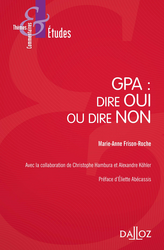
🌐suivre Marie-Anne Frison-Roche sur LinkedIn
🌐s'abonner à la Newsletter MAFR Regulation, Compliance, Law
____
► Référence complète : M.-A. Frison-Roche, GPA : dire Oui ou dire Non, avec la collaboration de Christophe Hambura et Alexandre Köhler, préface d'Éliette Abécassis, Dalloz, novembre 2018, 161 p.
____
► Présentation générale de l'ouvrage : Les situations juridiques de GPA et les différents droits applicables sont souvent présentés comme « complexes ». C'est faux. Il s'agit toujours d'une femme qui « consent » à porter un enfant pour le donner à la naissance à ceux qui ont commandé sa venue au monde. Face à ce fait simple, le Droit choisit soit d'instituer un lien de filiation entre la femme et l'enfant soit de l'instituer entre l'enfant et ceux qui l'ont désiré. Dans le premier cas, c'est la maternité qui fait la filiation, dans le second cas c'est le pur désir d'enfant. Dans le premier cas, les entreprises sont exclues car on ne peut vendre le lien de maternité, dans le second cas elles sont centrales car on paye pour concrétiser son désir d'enfant. Le choix est aujourd'hui ouvert. C'est un choix de société.
Les États-Unis et l'Europe sont souvent présentés comme ayant fait les mêmes choix. C'est faux. La Californie a fait le choix du désir d'enfant, servi par le consentement, l'argent et le contrat. L'Europe s'y refuse : pour protéger les êtres humains, lois et juges ne scindent pas le corps des femmes et des enfants de la notion de « personne ».
Comment et jusqu'à quand ?
____
📕consulter la table des matières
____
📝lire l'article d'introduction de Marie-Anne Frison-Roche
____
🚧lire le document de travail ayant servi de base à la partie de l'ouvrage rédigée par Marie-Anne Frison-Roche, enrichie dans sa version numérique par des notes de bas de page, des références techniques et de liens hypertextes
________
Nov. 27, 2018
Publications
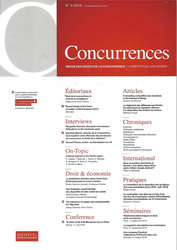
► Full Reference : Frison-Roche, M.-A., Droit de la concurrence et droit de la compliance ("Competition Law and Compliance Law), November 2018, in Revue Concurrences n° 4-2018, Art. n° 88053, pp. 1-4.
_____
► Summary: Compliance Law is a new branch of Law, still under construction. One can have a “narrow definition” of seeing it as the obligation of businesses to show that they are constantly and actively complying with the law. One can have a richer definition, of a substantive nature, defining it as the obligation or the own will of certain companies to achieve “monumental goals” that go beyond economic and financial performance. Competition Law partly integrates its two conceptions of Compliance: Precursor, Competition Law concretizes dynamically the first conception of Compliance Law. It is with more difficulties but also much more future that Competition Law can express in dialectic the second conception of Compliance Law as internationalization of these “monumental goals”, especially in the digital space.
📝 read the article (in French)
________
Nov. 21, 2018
Publications
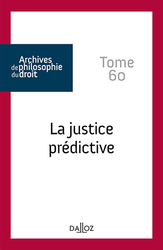
Référence générale : Frison-Roche M.-A., Pour protéger les êtres humains, l'impératif éthique de la notion juridique de personne, in in "Droit et Ethique" (dossier spécial des Archives de Philosophie du Droit) Archives de Philosophie du droit (APD), La justice prédictive, Dalloz, 2018, z, pp. 363-378.
Résumé : C'est par le Droit que l'être humain a acquis en Occident une unité (I). Ce que la Religion avait pu faire, le Droit l'a également fait en posant sur chaque être humain la notion indétachable de lui de « personne » (I.A). Mais c'est cela qui est remis en cause aujourd'hui, non pas la personnalité et le pouvoir que l'être humain a d'exprimer sa liberté mais l'unité que cela implique dans la disposition que l'on a de soir en repoussant le désir qu'autrui a toujours eu de disposer de nous. Le Droit actuel tend en effet à « pulvériser » les êtres humains en données et à transformer en prestations juridique de « consentement », cessant d'être une preuve d'une volonté libre mais devenue une notion autonome , y suffirait (I.B.).
Pour empêcher que ne règne plus que la « loi des désirs », laquelle ne fait que traduire l'ajustement des forces, il faut requérir ici et maintenant la souveraineté éthique du Droit, parce que le Droit ne peut pas être qu'une technique d'ajustement des intérêts (II). L'on peut former cette requête si l'on ne veut pas vivre dans un univers a-moral (II.A), si l'on constate que l'unité de la personne est l'invention juridique qui protège l'être humain faible (II.B.). Si on en admet l'impératif, il faut alors se demander enfin qui en Droit va l'exprimer et l'imposer, notamment de la Loi, ou du Juge, car nous semblons avoir perdu la capacité de rappeler ce principe de la Personne sur laquelle l'Occident fut si centré. Or, les principes qui ne sont plus dits disparaissent. Il ne resterait plus alors que l'ajustement au cas par cas des intérêts entre êtres humains dans champ mondial des forces particulières. À cette aune, le Droit ne serait plus qu'une technique de sécurisation des ajustements particuliers. (II.C). Réduit à cela, le Droit aurait perdu son lien avec l'Éthique.
Consulter une présentation de l'ouvrage dans lequel l'article est publié.
Voir la présentation d'autres tomes des Archives de Philosophie du Droit.

Nov. 8, 2018
Publications

► Référence complète : M.-A. Frison-Roche, La conception de la mise en place de la transformation des Commissaires-priseurs en Opérateurs des ventes volontaires à travers les principes du Droit de la Régulation et de la Compliance, document de travail, novembre 2018.
____
Ce document de travail est le sous-jacent de l'audition du 9 novembre 2018 devant une mission menée au Ministère de la Justice sur l'avenir des opérateurs de ventes volontaires.
____
► Résumé du document de travail : Il s'agit de montrer en premier lieu que la pratique professionnelle des commissaires-priseurs doit être appréhendée par le Droit de Régulation, puisque celui-ci a pour objet de construire et de maintenir dans le temps un équilibre instable entre le principe de concurrence (car il s'agit d'une activité marchande) et d'autres soucis (car il s'agit d'enjeux de patrimoines nationaux, d'histoire, de beau). Puis de montrer dans un second temps que ce soin d'un tel équilibre, qui aboutit à une notion de "place", doit être internalisé dans les maisons elles-mêmes : c'est l'objet du Droit de la Compliance, qui prolonge le Droit de la Régulation. C'est pourquoi le Conseil des Ventes volontaires doit lui-même se penser comme une Autorité de Supervision (sur le modèle bancaire).
____
🔓lire le document de travail ci-dessous ⤵️
Nov. 7, 2018
Publications
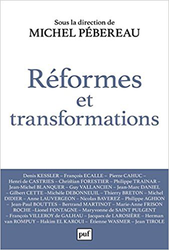
►Référence complète : M.-A. Frison-Roche, M.-A., "Le système juridique français constitue-t-il un atout ou un handicap pour nos entreprises et nos territoires ?" in M. Pébereau, M. (dir.), Réformes et transformations, PUF, 2018.
____
Résumé de l'article : La formulation de la question posée est comme une fermeture de tout débat, posant implicitement que le Droit devrait servir l'Économie et le servir "bien" (atout) plutôt que "mal" (handicap), alors qu'il faudrait s'accorder sur une méthode consistant pour chaque discipline à l'œuvre à ne prendre l'ascendant sur l'autre (I). Ce jugement doit être global, porter sur le droit en tant qu'il est un système. Quand on lit les différents travaux, ils ne portent que sur tel ou tel mécanisme, au mieux sur tel ou tel branche du Droit, ce qui méconnaît le fait que le Droit français est un système (II). C'est pourtant bien qu'en tant qu'il est un système que le Droit français doit être saisi, l’appréhender non seulement par ses signaux forts, mais aussi par ses signaux faibles Ceux-ci peuvent constituer les atouts les plus précieux (III). Plus encore, il est fructueux de donner plein effet à ce terme si particulier et peu souvent valorisé qu’est le terme de « territoire », placé dans la question, terme si ancien et aujourd'hui si intriguant puisque de "nouveaux territoires" s'offrent à nous : le digital, l’Europe. Et là, le système juridique français, que peut-il apporter, portant alors ce que l’on pourrait appeler la gloire française, car le Droit est comme le Politique une discipline qui porte des « prétentions », par exemple celle de construire l’Europe, par exemple l’Europe digitale (IV).
____
____
🚧Lire le document de travail ayant servi de base à l'article.
________
Nov. 5, 2018
Publications
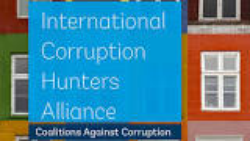
Sous l'égide de la Banque Mondiale, tous les deux ans, se réunit l' "Alliance des chasseurs de la corruption".
Les 25 et 26 octobre 2018, la rencontre se déroulait à Copenhague.
L'on pouvait suivre en direct les travaux de cette rencontre, qui demeurent ainsi disponibles.
L'on peut faire trois observations.
1. Tous stakeholders ! Sur le fond, l'on soulignera que, comme y a insisté au nom de la Banque Mondiale Pascale Dubois, elle-même en charge des politiques d'intégrité lors de la mise en place des programmes dans les pays, les actions contre la corruption bénéficient de plus en plus de l'action des entreprises, qui aujourd'hui voient leur réputation impliquée, réputation qu'elles perçoivent comme un actif à préserver ce qui justifie leur participation active à cette "Alliance". Cela renvoie à l'idée d'un "cercle de confiance" sur lequel repose la Compliance, même lorsqu'il y a contrainte exercée sur les entreprises, l'oratrice ayant abondamment parlé des programmes de compliance.
2. Une "Alliance" plutôt qu'un Ordre international inefficace ! Entre la forme et le fond, et bien que l'on puisse trouver grâce aux sites les précédentes rencontres biennales, le terme commun d' "Alliance" dans l'intitulé même d' International Corruption Hunters Alliance a de quoi retenir l'attention. En effet, dans l'ordre international ce sont les institutions internationales qui se rencontrent selon des formes codifiées, avec des textes, voire des accords, qui en résultent. Ici, nous avons des personnes "impliquées", à tous les titres : Etats, organisations publiques mais aussi entreprises et organisations non-gouvernementales. Comme le reflètent ce terme sans cesse utilisé par ces travaux de stakeholders, terme qui a la caractéristique pratique de pouvoir inclure tout le monde.
Il est vrai que la corruption est un fléau mondial qui concerne le particulier, les entités et les systèmes dont les institutions sont gardiennes : chacun peut donc à la fois en dire quelque chose et agir. Cette "Alliance" marque simplement le recul assumé d'un "ordre international" qui sans doute n'a pas pu se constituer à temps, alors que la criminalité trouve dans la globalisation un espace naturel, utilisant la fragmentation territoriale des Droits comme un bouclier que l'impératif de lutte ne semble plus pouvoir tolérer...
3. Tous "chasseurs" ! ou l'archaïsation du Droit de la Compliance. Le terme de "chasseurs" (hunters) est sur la forme plus encore remarquable. Cela rappelle le temps des "chasseurs de prime". Et c'est d'ailleurs parfois à ceux-ci que l'on compare les "moniteurs" dont l'efficacité est requise dans les techniques de programmes de compliance, leur exploits qu'ils relatent sur leur site étant parfois comparés à un "tableau de chasse" à la vue des entreprises terrassées. Cela n'est pas critiquable en soi. L'idée est qu'il faut pourchasser un fléau (la corruption étant implicitement comparée à une sorte de bête sauvage qui ravage tout).
Face à ce but, chacun est chasseur, l'entreprise comme l'ONG comme le tribunal comme le Gouvernement. Cela est de fait d'autant plus pertinent que sous un angle mondial la corruption s'étant infiltrée dans chaque catégorie, il convient sans doute de revenir à un tableau plus simple et plus archaïque : un fléau bien identifié (la corruption) et tout intéressé à l'éliminer dans une chasse "collective" (les intervenants ayant tous insisté sur ce caractère collectif).
Si on l'analyse du point de vue du droit, cela signe une nouvelle fois le mouvement d'archaïsation très fort du Droit de la Compliance, puisque les catégories juridiques s'effacent (par exemple la distinction entre l'entreprise privée et l'Etat) pour privilégier l'efficacité au regard d'un but.
Dans ce droit, dont Alain Supiot souligne notamment le caractère régressif et guidé par le principe de l'efficacité (qui n'est qu'un principe procédurale), pondéré par le principe de proportionnalité (qui n'est lui-aussi qu'un principe procédural), le Droit de la Compliance apparaît comme un Droit nouveau, dont il ne faut sans doute se contenter de viser comme seul principe l'efficacité.
En effet, et comme cela a été bien exposé à Copenhague, les criminels corrupteurs et corrompus ne connaissent plus les frontières dans leur activité mais les redécouvrent, utilisant la territorialité du Droit en défense lorsque des comptes leur sont demandés. La réponse du Droit est pour l'instant dans l'extraterritorialité des règles, les Etats se disputant alors, tandis qu'ils ne semblent s'accorder que dans l'informel des "alliances".
Tout cela montre l'urgence technique de concevoir d'une façon plus substantielle un Droit de la Compliance.
________
Nov. 5, 2018
Publications

Référence générale : Frison-Roche, M.-A., Banque et concurrence, in "Mélanges en l'honneur du professeur Claude Lucas de Leyssac", LexisNexis, 2018, pp.165-180.
Résumé : Banque et concurrence ne font pas bon ménage. Ce n'est pas tant que les banques feraient figure de récidivistes à propos desquels les autorités de concurrence devraient hausser le ton par des sanctions toujours plus lourdes afin que la leçon concurrentielle soit enfin entendue. Ce sont plutôt deux ordres qui s'affrontent, deux incompréhensions face à face. En effet les banques trouvent adéquat de s'entendre pour que le système bancaire fonctionne. Plus encore, les pouvoirs publics leur demandent un comportement politique en finançant l'économie lorsque celle-ci ne s'appuie pas sur les marchés financiers, voire de lutter contre l'exclusion sociale en pratiquant « l'inclusion bancaire », bastion avancé de la conception de l'entreprise promue par le Plan très politique d'Action pour la Croissance et le Transformation des Entreprises (PACTE). dès lors, comment elles-mêmes auraient-elles un comportement de marché consistant dans un comportement égoïste et d'agression envers leur homologue ?
Si l'on plonge dans ce creuset de l'incompréhension qui engendre le heurt violent entre les banques, qui évoquent leur mission, et les autorités de concurrence, qui se prévalent de la leur, on bute sur l'écueil de la définition même de ce qu'est une banque. L'on peut estimer qu'une banque est un prestataire de services divers, agissant sur des marchés en concurrence ; le droit assure le bon fonctionnement de ceux-ci, les autorités qui gardent l’efficacité des marchés se saisissant des banques qui y exercent leurs activités. Mais si l'on choisit d'insister sur le fait que les banques sont ce qui fait fonctionner l'économie et consolident le lien social, elles sont alors partie intégrante d'un système propre : le système bancaire, lequel est un élément essentiel de la société. La concurrence n'y est plus qu'adjacente.

Oct. 4, 2018
Publications

This working paper serves as the basis for an intervention in the conference held at the Collège de France.
Read the presentation of this conference (made in French).
SUMMARY :
For the moment, Compliance can be considered as almost "nothing" because in Europe Compliance is just a "reaction", verty technical, costly and empty against the U.S.(I). And for the moment, we only see one accumulation of mechanical sectorial constraints guided by the concern of efficiency, without associating this to the construction of the Europe .(II) On the contrary, what is before us, the tools and actors being already available : formulating the political goal of the Compliance Law: building Europe, a market where the center is the Person (III.

Oct. 1, 2018
Publications

► Full Reference: Frison-Roche, M.-A., Competition Law & Compliance Law , Working Paper, October 2018.
____
► this Working Paper has served as basis for an Article published later in French in the Review Concurrences ; read the presentation in English of this Article.
____
► Summary and introduction : Compliance Law is a new branch of Law, still under construction. One can have a "narrow definition" of seeing it as the obligation of businesses to show that they are constantly and actively complying with the law. One can have a richer definition, of a substantive nature, defining it as the obligation or the own will of certain companies to achieve "monumental goals" that go beyond economic and financial performance.The Competition Law partly integrates its two conceptions of Compliance: Precursor, the Competition Law concretizes dynamically the first conception of the Compliance Law (I) It is with more difficulties but also much more future that the Competition Law can express in dialectic the second conception of the Compliance Law as internationalization of these "monumental goals", especially in the digital space (II).

Updated: Sept. 8, 2018 (Initial publication: April 30, 2018)
Publications

► This working document was intended to serve as a support for a conference pronounced in French in the conference Droit et Ethique ( Law & Ethics) of May 31, 2018 in a symposium organized by the Court of Cassation and the Association Française de Philosophie du Droit. French Association of Philosophy of Law on the general theme Law & Ethics.
See a general presentation of this conference.
Rather, it has served as a support for the article to be published in the Archives de Philosophie du Droit (APD). This article is written in French.
► Summary: It is through the Law that the human being has acquired a unity in the West (I). What religion could have done, the Law also did by posing on each human being the indetachable notion of him of "person" (I.A). But this is what is challenged today, not the personality and the power that the human being has to express his freedom but the unity that implies in the disposition that we have of ourselves in repelling the desire that others have always had to dispose of us. Current law tends to "pulverize" human beings into data and transform into neutral legal services what was considered before as the devouring of others. The legal concept of "consent", ceasing to be proof of a free will but becoming an autonomous concept, would suffice (I.B.).
To prevent the reigning of the "law of desires", which merely reflects the adjustment of forces, we must demand here and now the ethical sovereignty of Law, because Law can not be just just be just the interests adjustment (II). We can form this request if we do not want to live in an a-moral universe (II.A), if we see that the unity of the person is the legal invention that protects the weak human being (II.B.). If we admit this imperative, then we must finally ask who in the legal system will express and impose it, especially the legislator or the judge, because we seem to have lost the ability to recall this principle of the Person on which the West was so centered. But the principles that are no longer said disappear. There would then remain only the case-by-case adjustment of interests between human beings in the world field of particular forces. At this yardstick, Law would be more than a technique of securisation of particular adjustments. Law would be reduced at that and would have lost its link with Ethics. (II.C).

Updated: Sept. 1, 2018 (Initial publication: May 10, 2018)
Publications

This working paper has served as a basis for an article written in French in the book Compliance : Entreprise, Régulateur, Juge ("Compliance: Enterprise, Regulator, Judge"), published in May 2018 in the Regulations Series of Dalloz editions (Paris).
See the other books published in this collection (presentation in French), directed by Marie-Anne Frison-Roche (presentation in English).
ABSTRACT: The Company, the Regulator and the Judge are three key figures for the construction of an emerging Compliance Law. An important risk lies in a confusion of their respective roles, the company becoming a regulator, the regulator becoming a board of a place that goes to the conquest of others, the judge standing back. It is appropriate that each plays his role and that their respective function is not distorted. If this confusion is avoided, then the points of contact can multiply and one observes it. But as soon as everyone remains in its place, we can go further than these points of contact and if they agreed, the three characters can reach common goals. This is all the more legitimate since Compliance Law, as Regulation Law, is teleological in nature, which makes these branches of law profoundly political. These common goals are technical, such as risk prevention. They can be more political and higher, if there is a shared will, without ever one of the characters being captured by another: it is then to concern by the human being. The designation of this common goal to the Company, the Regulator and the Judge can be expressed in one word: Europe.

Aug. 2, 2018
Publications

L’on présente la situation de GPA en disant souvent qu’elle est « complexe », ce qui implique mille réflexions avant d’avoir une opinion nette, voire que cela exclut d’en avoir une. La position adéquate serait bien plutôt de dessiner de multiples solutions : parce qu’il y aurait tant de cas possibles, mille cas possibles, allant de la plus horrible des situations à la plus admirable, ce qui doit impliquer mille solutions adaptées à chaque cas, de l’exclusion horrifiée dans certains cas à l’admission enthousiaste dans d’autres. Mais de position de principe, non, cela serait tout à la fois impossible, car réducteur de la réalité humaine et inadéquat, car cette réalité serait si « complexe ».
Cette complexité ne serait comprise que par quelques experts qui diront ce que l’opinion publique doit penser, experts qui raconteront les cas qu’ils connaissent dans leur diversité, puisque la GPA relève de leur domaine d’expertise. Ainsi la GPA serait une question d’expertise, dont nous ne devrions pas avoir souci en ce que cela ne concerne que quelques milliers de cas, qui ne peut être véritablement comprise que de professionnels en médecine ou en droit de la famille, et qui doit recevoir des centaines de solutions adaptées à chaque cas, solutions élaborées par ces experts.
Cela est faux. La situation de GPA est simple. Et la position qu’elle appelle est également simple. Il faut faire un choix : dire Oui à la GPA ou dire Non à la GPA. C’est non seulement aisé à faire mais c’est pour nous un devoir de le faire car à travers ce cas qui paraît si particulier de la GPA c’est un choix de société qui s’opère et dont les citoyens ne peuvent être exclus, puisqu’il s’agit de déterminer quelle est la place de l’être humain dans l’organisation économique et sociale.
La réponse positive, qui conduit à admettre la pratique de la GPA, comme la réponse négative, qui conduit à exclure cette pratique, peuvent être formulées. Les deux réponses peuvent être étayés sur des arguments forts. Il est essentiel de ne pas les craindre. Mais il est aujourd’hui crucial de faire ce choix collectif clairement car à travers cette question qui paraît particulière et circonscrite de la GPA, c’est un choix de société qui est fait aujourd’hui et maintenant.
Si nous ne le faisons pas explicitement, par le seul jeu de nos comportements qui se superposent sur nos silences, nos ambiguïtés, notre lâcheté aussi qui se dissimule sous le prétexte de ce qui serait le discours de la "complexité", le choix se fera de lui-même.
Il est déjà en train de se faire : parce que nous n’avons pas le courage de dire clairement ce que collectivement nous voulons comme modèle de société pour nous êtres humains, nous coulons doucement vers une acceptation jour après jour, cas après cas, émiettement de règles après émiettement, exception après exception, vers un Oui.
Et pourquoi pas ? Pourquoi ne pas dire Oui à la GPA ? Il y a des arguments pour l’admettre. Mais il faut le faire clairement. En l’assumant. Dire Oui. Aller vers cette société-là.
Ou bien, si l’on ne le veut pas, parce que la GPA implique nécessairement un statut de la femme, de l’enfant, de l’être humain, et de l’organisation sociale, que l’on ne veut pas, alors il faut dire Non. Et cela aussi, il faut l’assumer.
Il faut dire, savoir dire Oui comme il faut savoir dire Non. C’est cela être responsable. Dans une société libérale, nous devons exprimer notre volonté et dire clairement ce que nous voulons.
Pour une question si importante, cette situation apodictique de la GPA conduisant à déterminer ce qui constitue la valeur d’un être humain, il n’est pas admissible de répondre à la fois Oui et Non, comme il n’est pas admissible de répondre ni Oui ni Non.
Il faut répondre nettement si le Droit, qui exprime et garde les valeurs fondamentales d’une organisation sociale et y place les êtres humains qui la composent, admet ou n’admet pas cette pratique. Oui ou Non.
Pour l’instant, à cette question il n’est plus répondu. Alors qu’il est admissible de répondre Non, qu’il est admissible de répondre Oui, il n’est pas admissible de ne pas répondre.
L’enjeu actuel n’est donc pas d’être pour ou d’être contre. L’enjeu est d’exiger que chacun assume sa position et qu’à partir de là, en raison de l’ampleur de la question générale impliquée par la situation particulière de la GPA, le Droit, le corps social et le Politique décident de la réponse, qui donne la place de l’être humain dans le système économique et social.
Ainsi, la Californie a choisi de répondre Oui, renvoyant à un certain modèle d’organisation économique et sociale. Que va faire l’Europe ?
Lire la suite en dessous.

Aug. 2, 2018
Publications

► Complete reference: Frison-Roche, M.-A., Yes to the principle of the will, No to the pure consents, working document for an article written in French Oui au principe de volonté, Non aux consentements purs, to Mélanges dedicated to Pierre Godé, 2018, available at http://mafr.fr/ en / article / yes-in-principle-of-the-desire-not in the consent /
► Summary: Pierre Godé devoted his thesis to defend the freedom of the human being, freedom that the person exercises by showing his will. This will manifests itself, even tacitly, by this trace of "consent". In a liberal society, politically and economically, that is to say a society based on the principle of the will of the person, consent must always be defined as the manifestation of the will, this link between consent and will being indivisible ( I). But by a perversion of liberalism, "consent" has become an autonomous object of the freedom of the person, mechanical consent that has made it possible to transform human beings into machines, machines to desire and machines to be desired, in a world of " pure consents","where we keep clicking, consenting to all without ever wanting. This consent, which has been split from the free will of the person, is the basis of the markets of the Human and the illiberal democracies, threats against human beings (II). The future of Law, in which Pierre Godé believed, is to continue to aspire to protect the human being and, without countering the free will of the human being as the movement of the law of the consumption had been tempted to, to renew with a liberal movement of Law and to fight against these systems of pure consents (III).
🔻read the article below (in French).
July 21, 2018
Publications
📝 Le Droit de la Compliance au-delà du Droit de la Régulation (Compliance Law beyond Regulation Law)

Full reference : Frison-Roche, M.-A., Le Droit de la Compliance au-delà du Droit de la Régulation, Recueil Dalloz, 2018, chronique, pp. 1561-1563.
Summary : A movement started from precise legal requirements linked to identified actors, as the financial or banking sector, to transform itself in legal norms of Compliance. Compliance Law is thus the extension of Regulation Law. But Compliance Law is taking its full autonomy with regards with Regulation Law, while retaining its violence, its radicalisé, and even its archaism, even though it concerns companies which do not act on regulated sectors, putting down, for instance, notions linked to territoriality (I). How companies should react face to this unequaled news (II)?
Read the table of contents of the Review (in French).
This document is based on a working paper with footnotes, technical references and hypertext links.
July 3, 2018
Publications

► Full Reference: Frison-Roche, M.-A., Dessiner les cercles du Droit de la Compliance, in Études en l'honneur de Philippe Neau-Leduc, Le juriste dans la cité, coll. « Les mélanges », LGDJ-Lextenso, 2018, pp. 483-496.
____
🚧this article is based on a Working Paper, with footnotes, technical references and hypertext links.
This Working Paper is freely available :
- in French: Tracer les cercles du Droit de la Compliance.
- in English: Drawing the circles of Compliance Law.
____
► English Summary of this article: Compliance Law has the same teleological functioning as the Economic Law to which it belongs, which consists in placing the normativity of rules, decisions and reasoning in the aims pursued. Once we know what the goals of compliance techniques are, then we know who should be responsible for them, who must be subject to them, who must activate the rules: compliance rules must be activated by those who are in the best position to achieve the outcome in order to achieve the goal sought by the authority which designed the compliance mechanism. The "circles" are thus plotted in a rational and pragmatic way. That, all of it ("useful effect"), but not beyond that. The notion of efficiency does not always imply balancing: on the contrary, it can involve drawing circles which designate those who are "placed" to carry the burden of the rules because they are capable of producing them the desired effects. Within these circles, the rules must apply without restriction and without compromise, but they must not apply beyond these circles.
Drawing such circles requires defining the Law of Compliance itself, since on the one hand the choice of those who must implement the Compliance depends on the aims of the Compliance and on the other hand the definition of the Law of Compliance is itself teleological in nature. This is why, contrary to the assertion that the exercise of definition would be useless in these matters, which would be above all on a case-by-case basis, this effort to define and determine the purposes is, on the contrary, necessary in practice to show which enterprise must bear the obligations of compliance and which must not.
But it is enough to have posed this to reveal the major difficulty of the Compliance, that explains resistances, and even gives the impression that one is confronted with an aporia. If, as a matter of principle, what is expected of the "users" of the Compliance mechanisms must be articulated to the aim that is affected by the authors of the compliance mechanisms to them, we must have a minimum correspondence between the aims of these authors (Legislators and Regulators) and the aims pursued by those who are responsible for implementing them: companies. However, this correspondence does not exist at first sight, because the compliance mechanisms are found to be uniquely based on "monumental goals" which the public authorities have a legitimate concern, whereas companies have for their own interest . The two circles do not match. The internationalization of concern for these aims in companies would therefore be only a mechanism of violence of which enterprises are the object, violence felt as such. (I).
To resolve this violence, it is better to stop confusing the State and enterprises, whose goals are not the same, and draw the circle of subjects of law "eligible" for Compliance. It is highly legitimate to target certain entities, in particular this category of companies, which are the "crucial operators", in a binding way, as it is legitimate to govern companies that have expressed a desire to surpass their own interests. These circles of a different nature can overlap on a concrete operator: for example, if a bank - always a crucial operator that is structural because it is systemic - is also international - a crucial operator because of its activity - decides to worry about others by commitments verified by the authorities to overcome their own interest (social responsibility), but these different circles are not confused. In any case, companies may belong to only one circle, or even belong to none. In the latter case, they must therefore remain beyond the reach of the pressure and cost of Compliance Law, in particular because they are not objectively required to realize the "monumental goals" aimed at effectiveness and do not want it: in a liberal system, it is for the public authorities to aim at the general interest, the ordinary people indirectly participating in it by paying the tax. (II).
It is by making these "Compliance Circles" of eligible subjects of this specific Law to implement the heavy but justified and controlled burden of Compliance with regard to the monumental goals that this new system aims, that then opens a royal way in order to find a uniqueness and to increase the "monumental function" of the Compliance Law by a relation of Trust towards the global general interest, rather than the mechanical application of rules whose meaning is not understood and whose perception is no longer perceived than violence.
____
________
July 1, 2018
Publications

Prenons le phénomène du côté du Droit.
Netflix n'est pas une entreprise de média. C'est une entreprise technologique qui capte des données.
Du point de vue du Droit, nous ne savons pas comment le qualifier.
Cela est perceptible en Droit de la concurrence et en Droit de contrôle des concentrations (qui appartient plutôt au Droit de la Régulation).
Pour l'instant nous ne sommes que dans la "réaction" : les autorités américaines "réagissent". Leur "réponse" consiste à ne plus mettre de freins aux concentrations dans les médias...
C'est tout d'abord une réponse faible et non-autonome, l'idée étant que si l'on laisse grandir Disney, alors Disney et Netflix pourront mieux s'entredévorer et le consommateur sera bien servi. C'est d'ailleurs ce qu'explique Netflix en affirmant que le consommateur a tant d'argent à affecter à ses loisirs et de temps à passer devant ses écrans qu'ils peuvent bien se le partager. Propos qui devraient glacer des autorités en charge de contrer les ententes....
C'est d'ailleurs une réponse qui peut avoir des conséquences graves car sans doute motivée par cette impuissance elle a donné le signal à d'autres, par exemple dans l'industrie pharmaceutique comme quoi avec un tel précédent il n'y avait donc plus de barrière pour de méga-fusions....
C'est ensuite une absence totale d'action.
Certes l'on peut adopter un point de vue américain : c'est aux entreprises d'agir et non pas aux Autorités publiques ou au Droit. C'est ainsi que l'innovation se développe, en laissant les entreprises libres, et c'est ainsi que la Silicon Valley a inventé le monde nouveau des données. Mais les données ont toujours existé puisque ce ne sont que des informations sur nous-mêmes, nous-mêmes et ce que nous donnons à voir de nous-mêmes ayant toujours existé. C'est l'idée même de les monétiser après les avoir pulvériser et reconstruite dans d'autres blocs (méta-données) qui les a transformées en or. C'est ce que démontre West Word, série magnifique produite par ... une industrie de média, HBO, pour répondre à Netflix.
Mais si l'on croit que le Droit sert encore à quelque chose, par exemple à "réguler les plateformes" car il s'agit de cela, il faudra mieux que nous "agissons", c'est-à-dire que nous pensions ce "cas Netflix", ou/et à travers lui l'industrie prodigieuses des données.
Elle a créé de l'or approprié à partir d'un commun disponible depuis toujours. Le génie a consisté à créer une industrie de la donnée indifférente à ce qui nous est donné en échange, ici un film, une série, une jeu. Contre lesquels l'industrie des films, des séries et des jeux ne peuvent pas grand chose car celle-ci vend les films, les séries et les jeux et ne peuvent pas les vendre à prix négatif, alors que Netflix ne les cèdent qu'en supplément de ce qui est acquis : l'information que nous donnons sur nous-mêmes. Ils peuvent donc nous offrir le film qui n'est qu'un "cadeau-bonux". C'est pourquoi la "personnalisation" extrême que Netflix fait de ses produits, aux différents pays devrait nous alerter. C'est pourquoi la haute-couture de séries faites que pour moi me donne l'information que je suis moi-même le plat principal du repas de roi ainsi servic.
En cela Netflix est économiquement beaucoup plus proche de Facebook qui nous donne tout gracieusement puisque nous nous donnons à lui que de Disney ou de HBO ou de Warner qui doivent encore prétendre nous demander un peu d'argent puisqu'ils prétendent encore avoir pour objets la production de films, de séries, de personnages, de scénarios, de jeux, etc.
La puissance du modèle tient dans la reconstruction par la technologie des données pour de très multiples usages. Par exemple la prévision de l'avenir. En échange, les sous-jacents que sont les personnes reçoivent pour l'instant une série sur la reine d'Angleterre. Mais pourquoi pas un bouquet de fleurs ? Ou un repas ? Ou un habit ? Ou une voiture ?
En effet, l'industrie des données a neutralisé le sous-jacent. Par exemple le média. Mais Uber apporte les repas. Netflix peut apporter un costume. Qui a quelque chose à "redire" ?
Face à cela, le Droit ne dit rien.
Sans doute parce qu'il est dépassé dans ses catégories et lorsque le Droit ne conçoit pas, ne qualifie pas, il ne peut rien "dire". Il a fallu que les juges voient dans les personnes qui roulent dans les voitures des "salariés" d'UBER pour qu'un peu d'ordre revienne. C'est donc dans les marques de la qualification que le Droit doit se retrouver.
Le Droit doit d'abord remettre en cause la notion de "gratuité" et de "don".
Le Droit ne pense toujours pas le gratuit, réduit à être l'absence d'échange d'argent, alors que je me donne moi-même. Et quand je me donne moi-même, le Droit appelle cela de "l'altruisme"..., alors que le Droit commercial ancien dans sa sagesse interdisait l'acte gratuit dans les affaires car l'on sait bien que l'on ne se donne pas contre rien. Le gratuit n'existe pas et le discours altruiste n'est pas inconcevable si c'est l'entreprise qui devient altruiste et peut le prouver (RSE) il devient très étonnant si ce sont les personnes qui se donnent elles-mêmes aux entreprises : le "discours du don" et l'appel au "consentement altruiste" n'ont jamais autant prospéré dans un système où l'unité de compte est celle du milliard de dollars.
Le Droit doit ensuite remettre en cause la notion d'espace, pour qualifier les "plateformes".
Pour l'instant l'on connaît peut-être la plateforme comme un fait, mais en Droit l'on ne sait pas ce que c'est. Un marché ? Une place ? Un point d'intersection ? Il est possible que l'on puisse réduire la plateforme à être un marché, au sens le plus traditionnel du terme, la place du marché où chacun peut se rencontrer et se dire avant tout bonjour, se regrouper en communautés. Une place de village plutôt qu'une place financière. Peut-être qu'il existe plusieurs sortes de plateformes, non pas selon les objets concrets qu'on vient y chercher ou y proposer car la plateforme se repère plutôt par celui qui la tient mais plutôt : par la technologie utilisée ? par le degré de connaissance de la personne qui y entre ? par le degré de civilisation qui y règne ?
Ces espaces que sont les places, les moteurs de recherches ou les réseaux sociaux sont-ils en Droit réductibles à une seule notion, de sorte qu'on puisse leur appliquer le même régime ? Lorsque les entreprises croisent leurs données, par exemple entre un média et un réseau, étant propriétaires des deux, le Droit appréhende la situation différemment suivant qu'il y voit deux espaces qui communiquent ou qu'un seul espace déjà en fusion.
Admettre en Droit que nous avons beaucoup à concevoir pour "réguler les plateformes".
_______________
June 30, 2018
Publications

This working paper is a basis for an article published in the Recueil Dalloz.
Compliance Law is a so recent branch of Law that some still doubt of its existence
It is not about taking back this question, nor the one of "definition" of Compliance and of its Law or of its appropriate translation.
The purpose of the thought is rather to observe the movement which came from precise sectorial Laws requirements, as Financial Law, Banking Law, which correspond without any doubt to "sectors", Compliance Law being thus the extension of Regulation Law
CONSEQUENCES ON COMPANIES OF A COMPLIANCE LAW BEYOND REGULATION LAW
Read the development below.
Frison-Roche, M.-A., Compliance Law, working paper, 2016.
Frison-Roche, M.-A., From Regulation Law to Compliance Law, 2017 and quoted references.
Frison-Roche, M.-A., Compliance: before, now, after, working paper, 2017.
June 27, 2018
Publications

Référence complète : Frison-Roche, M.-A., Le Juge, le Régulateur et le Droit, in L'ENA hors les murs, Le droit et la justice aujourd'hui. Et demain ?, n°481, 2018, pp.72-73.
Résumé. Du Juge, du Régulateur et du Droit, c'est plutôt le "Régulateur" qui vient en premier, mais cette prééminence vint parfois sur ordre du juge plutôt que sur décision autonome de l'État, même s'il s'avère que c'est toujours, voire avant tout, pour fonder une relation de confiance qu'un Régulateur est établi (I). Institué, le Régulateur doit se comporter dans ses pouvoirs ex post comme un Juge (II). Lorsque le Régulateur est en contact avec les juges, rapport obligé puisque que le Régulateur est soumis au Droit, l'entente est plus ou moins cordiale (III) et c'est la tension des relations entre Droit et Économie qui transparaît alors. Mais l'Europe est l'espace où les conciliations se font plus aisément, notamment grâce à la puissance et l'autorité de ses Juges, comme le montre l'Union bancaire (IV). La mondialisation ayant rebattu la carte des puissances et des dangers, les prétentions du Droit sont aujourd'hui internalisées dans les entreprises mêmes : le Droit de la Régulation se transforme en Droit de la Compliance, par lequel l'"entreprise cruciale" devient une structure qui juge et applique , y compris à elle-même, des normes mondiales pour atteindre des "buts monumentaux" exprimés par les États (V). En cela la "lutte pour le Droit" pourrait se faire dans un nouveau jeu entre les entreprises, les Juges et les Régulateurs.
Cet article s'appuie sur un document de travail.
Celui est doté de notes de bas de pages, de références techniques et de liens hypertextes.
Il est accessible en langue française par le lien suivant : Le Juge, le Régulateur et le Droit.
Il est accessible en langue anglaise par le lien suivant : The Judge, the Regulator and the Law.

June 7, 2018
Publications

L'on semble bien obnubilé par le "RGPD"... Que l'on étudie virgule après virgule. Cela se comprend puisqu'il faut bien des modes d'emploi.
Il convient aussi de regarder ce qui a constitué son terrain et son contexte, avant de comprendre de quoi ce Règlement est porteur.
Pour le comprendre, il faut sans doute regarder certains détails, certains mots (sa "lettre"), son but (son "esprit"). D'ailleurs,classiquement en Droit dans le Code civil il est rappelé que pour connaître l'esprit d'un texte il faut partir de sa lettre, c'est-à-dire de ses mots. Et là, l'on est bien ennuyé pour que nous ne parlons que par sigles : RGPD, RGPD ... Mais ce sigle est-il même exact ? Est-ce là le titre du Règlement de 2016 ? Non. Le juriste, qu'il soit européen ou américain, de Civil Law ou de Common Law, ne lit pas les commentaires : il lit les textes, les lois et les jurisprudences. Il cherche les définitions et les qualifications. Il replace les mots qui se saisissent des réalités dans l'ensemble : par exemple : la "donnée". Il en cherche la définition. Qui définit ce qu'est une "donnée" ?
Puis il prend une perspective. Non pas parce qu'il est un bel esprit, qui aime les perspective. Non, le juriste est plutôt un esprit besogneux, assez plat. La perspective vient de la matière. Mais on sommes en "Droit économique". Et même en "Droit de la régulation". Or, dans ces matières-là, il n'est pas contesté que la "norme", le principe, celui qui donne un sens aux définitions, aux qualifications, aux règles techniques, qui donnent des solutions aux cas non prévus par le texte, est dans le but poursuivi par les dispositions : c'est un Droit de nature "téléologique".
Quel est le but du "RGPD". Il suffit de lire le titre de ce Règlement. Cela est bien difficile, puisqu'un sigle l'a désormais recouvert ... Mais ce règlement du 27 avril 2016 est relatif à la protection des personnes physiques à l'égard du traitement des données à caractère personnel et à la libre circulation de ces données
Il a donc deux buts : la protection des personnes ; la circulation des données.
Il faut donc poser que le but du Règlement est la construction de l'Europe numérique, sur le principe de circulation des données, principe libéral classique qui construit un espace par la dynamique de la circulation : c'est la perspective de l'Europe numérique qui anime le Règlement (I). Pour ce faire, quelle est la nouveauté du système ? Elle tient en une seule chose. Car le Parlement français a insisté sur le fait que la nouvelle loi de transposition adoptée le 17 mai 2018 vient modifier la loi informatique et Libertés de 1978 sans la remplacer. La nouveauté tient dans le fait que ce ne sont plus les Autorités publiques, nationales ou de l'Union qui sont en charge de l'effectivité du dispositif, mais les entreprises elles-mêmes : la Régulation digitale (qui demeure publique) a été internalisée dans les entreprises. Il s'agit désormais d'un mécanisme de "Compliance". En cela, le "RGDP" est non seulement le bastion avancé de l'Europe numérique, mais encore le bastion avancé de "l''Europe de la Compliance". Celle-ci a un grand avenir, notamment vis-à-vis des Etats-Unis, et les entreprises y ont un rôle majeur. Le numérique n'en est qu'un exemple, le Droit européen de la Compliance étant en train de se mettre en place.